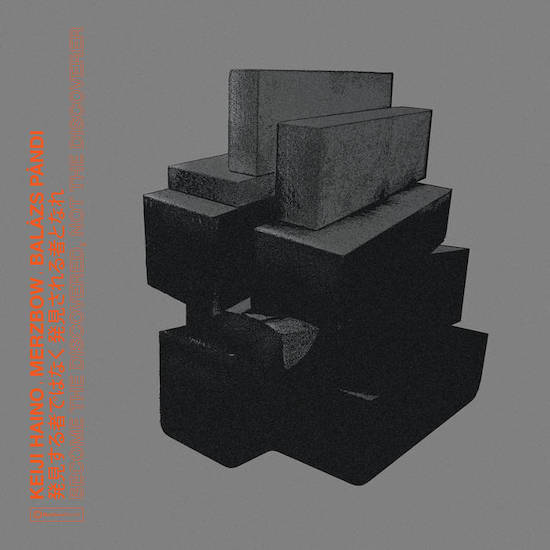Before pressing play a quick look at the artwork gives some subtle clues of what to expect. The cover depicts what appear to be solid blocks of concrete stacked on each other. The colour of the blocks ranges from grey at the top to black at the bottom. It suggests that Become the Discovered, Not the Discoverer will be a densely layered affair which offers few respites from the heavy vibes being given off by the players.
After pressing play it only takes six seconds to have our perceptions from the cover confirmed. Searing feedback and stark irregular drumming starts and then it starts to devolve into shifting swathes of brutal noise and confusion. And it’s glorious for it. As ‘Become the Discovered I’ progresses things start to take on a strangely more conventional vibe. There are actual riffs and the drumming is in regular time, something that Pándi doesn’t really do anymore. Yes, these moments are fleeting, but when it all connects it feels like this is Merzbow, Haino and Pándi’s take on those classic rock bands that built their songs around a single riff or refrain.
What’s more remarkable is that it kind of works. There are moments when Merzbow and Haino are playing these – dare I say – catchy riffs and Pándi is adding texture and colour with his drumming and, yes, it has an enjoyable primal, devolved, quality to it.
‘Become the Discovered, Not the Discoverer II’ offers more of the same: abrasive riffs and rippling percussion, but it isn’t until ‘I Want to Learn to feel Everything in Each Single Breath’ that things calm down a bit and we are given room to breathe. If ‘Become the Discovered…’ were exercises in excess, ‘I Want to Learn…’ feels like an exercise in restraint. Gone are the walls of feedback, replaced by tonal guitars and sparse, shimmering, drumming. We can hear every note that Merzbow and Haino play. There are tinges of free jazz. As the songs progress, the noisy element starts to emerge again, but they never reach the apocalyptical levels of the opening tracks, instead it is used to add texture and emotion to the tracks.
In Pándi, Merzbow and Haino have found a new collaborator to forward their noisy agenda, and maybe more importantly, they’ve found someone who can tone things down and fill in the gaps between the rock and the hard place that their music represents.


